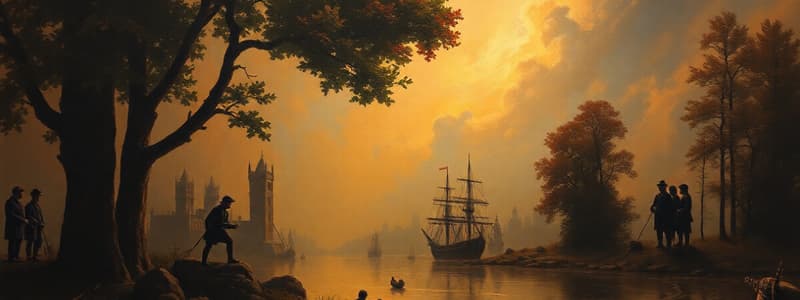Podcast
Questions and Answers
What does the term 'Intellectual Revolution' primarily refer to?
What does the term 'Intellectual Revolution' primarily refer to?
- The advancement of science and technology due to human needs. (correct)
- A time when religion and science completely overlapped.
- A period of artistic and literary achievements.
- The establishment of the geocentric model of the universe.
Which key aspect characterized the Scientific Revolution?
Which key aspect characterized the Scientific Revolution?
- A shift towards questioning existing scientific methods. (correct)
- Focus solely on religious explanations for natural phenomena.
- Complete disregard for the teachings of Aristotle.
- Acceptance of traditional beliefs without question.
What was the prevailing model of the universe before the mid-1500s?
What was the prevailing model of the universe before the mid-1500s?
- The flat Earth model widely accepted by scientists.
- A dualistic approach combining both heliocentric and geocentric theories.
- A geocentric model with the Earth at the center. (correct)
- The heliocentric model with the Sun at the center.
What fueled the questioning spirit during the Scientific Revolution?
What fueled the questioning spirit during the Scientific Revolution?
How did the Church react to the advancements in science during the Scientific Revolution?
How did the Church react to the advancements in science during the Scientific Revolution?
Which figure's teachings were primarily accepted before the Scientific Revolution?
Which figure's teachings were primarily accepted before the Scientific Revolution?
What significant change occurred during the Scientific Revolution regarding scientific inquiry?
What significant change occurred during the Scientific Revolution regarding scientific inquiry?
What was a consequence for some scientists during the Scientific Revolution?
What was a consequence for some scientists during the Scientific Revolution?
What major shift did the Industrial Revolution signify?
What major shift did the Industrial Revolution signify?
Which individuals were primarily associated with advocating the scientific method?
Which individuals were primarily associated with advocating the scientific method?
What was a significant outcome of Copernicus's work in 1543?
What was a significant outcome of Copernicus's work in 1543?
What role did universities established in the 12th century play in the Scientific Revolution?
What role did universities established in the 12th century play in the Scientific Revolution?
Which invention was NOT a significant technological advancement during the Scientific Revolution?
Which invention was NOT a significant technological advancement during the Scientific Revolution?
What was one effect of translating the works of Muslim scholars on European thought?
What was one effect of translating the works of Muslim scholars on European thought?
What was a major philosophical shift during the Scientific Revolution?
What was a major philosophical shift during the Scientific Revolution?
Which of the following best describes the impact of the Age of Exploration on scientific research?
Which of the following best describes the impact of the Age of Exploration on scientific research?
What is the primary role of humans in artificial selection as described by Darwin?
What is the primary role of humans in artificial selection as described by Darwin?
What did Darwin understand about variation in species?
What did Darwin understand about variation in species?
What does the term 'struggle for existence' refer to in Darwin's theory?
What does the term 'struggle for existence' refer to in Darwin's theory?
What did Darwin conclude about the traits of individuals in a species?
What did Darwin conclude about the traits of individuals in a species?
What prompted Darwin to present his work at a scientific meeting in 1858?
What prompted Darwin to present his work at a scientific meeting in 1858?
What was the predominant belief about the structure of the universe before Copernicus proposed his theory?
What was the predominant belief about the structure of the universe before Copernicus proposed his theory?
Why did many scholars reject Copernicus's heliocentric theory?
Why did many scholars reject Copernicus's heliocentric theory?
What significant contribution did Tycho Brahe make to astronomy?
What significant contribution did Tycho Brahe make to astronomy?
What did Johannes Kepler discover about the orbits of the planets?
What did Johannes Kepler discover about the orbits of the planets?
What was Galileo Galilei's observation regarding the moons of Jupiter?
What was Galileo Galilei's observation regarding the moons of Jupiter?
What event led to Galileo Galilei being punished by the Church?
What event led to Galileo Galilei being punished by the Church?
What was a consequence of Galileo's conflict with the Church?
What was a consequence of Galileo's conflict with the Church?
Which theory did both Copernicus and Ptolemy believe about planetary orbits?
Which theory did both Copernicus and Ptolemy believe about planetary orbits?
What concept did Lamarck propose regarding the evolution of traits in organisms?
What concept did Lamarck propose regarding the evolution of traits in organisms?
Which of the following was a result of Malthus's observations about population growth?
Which of the following was a result of Malthus's observations about population growth?
What did the iceberg theory propose regarding the levels of consciousness?
What did the iceberg theory propose regarding the levels of consciousness?
Which aspect of personality does the superego represent?
Which aspect of personality does the superego represent?
What primarily drives the id according to Freud's theory of personality?
What primarily drives the id according to Freud's theory of personality?
How does the ego function in Freud's structure of personality?
How does the ego function in Freud's structure of personality?
Which statement accurately reflects Malthus's view on reproductive rates in organisms?
Which statement accurately reflects Malthus's view on reproductive rates in organisms?
What characteristic of evolution did Lamarck contribute to subsequent theories?
What characteristic of evolution did Lamarck contribute to subsequent theories?
Flashcards are hidden until you start studying
Study Notes
Intellectual Revolution
- Aims to understand paradigm shifts throughout history.
- Identifies key figures and events of the Intellectual Revolutions.
Scientific Revolution
- Spans from the 16th to 17th century, representing a significant change in scientific inquiry.
- Rooted in the Renaissance's spirit of questioning traditional beliefs and the Church's authority.
- Prior to 1500, accepted authorities were the Bible and Aristotle, with a geocentric universe dominated by Earth.
- Notable advancements emerged from human needs, spurring new technologies and ideas.
Genesis of the Scientific Revolution
- Significant figures include Nicolas Copernicus, Francis Bacon, Rene Descartes, and Isaac Newton.
- The new science philosophy utilized the scientific method, advocating a more empirical approach.
- Establishment of universities led to critical analysis of Aristotelian ideas.
- Innovations like the telescope and printing press facilitated spread of knowledge.
- Age of Exploration necessitated scientific research for navigation.
Key Figures
Nicolaus Copernicus
- Proposed heliocentric theory in "On the Revolutions of the Heavenly Spheres" (1543).
- Demonstrated that Earth revolves around the Sun, challenging Ptolemaic and Church views.
- Faced substantial resistance from scholars and the Church for contradicting established beliefs.
Tycho Brahe
- Danish astronomer who supported Copernicus’ theory through extensive sky observations.
- Established an observatory and compiled crucial astronomical data.
Johannes Kepler
- Brahe’s assistant known for calculating planetary orbits, affirming the heliocentric model.
- Discovered that planets move in elliptical orbits, refining earlier theories.
Galileo Galilei
- Constructed the first telescope, observing celestial phenomena such as moons of Jupiter.
- His advocacy for heliocentrism resulted in conflict with the Church, leading to house arrest after recanting his beliefs.
Charles Darwin and Evolution
- Examined natural variations in species, recognizing significance of artificial selection by humans.
- Published "On the Origin of Species" in 1859, presenting his evidence for evolution.
- Malthus’ theory of struggle for existence influenced Darwin's ideas on competition for resources.
Theories of Variation and Adaptation
- Natural variations contribute to survival; traits may aid in meeting environmental demands.
- Evolutionary changes involve competition, survival, and better adaptations.
Influence of Thomas Malthus
- Observed that population growth outpaced resources, suggesting crises could impact survival rates.
- Malthus' findings extended beyond humans to other living organisms, emphasizing potential overpopulation issues.
Sigmund Freud and Psychoanalysis
- Founded psychoanalysis, bridging psychology and science, focusing on human behavior.
- Developed the Iceberg Theory of consciousness, describing layers of awareness.
Structure of Personality
- Id represents unconscious impulses driven by pleasure.
- Ego mediates between id demands and reality, managing self-identity.
- Superego embodies moral constraints, guiding right and wrong through conscience.
Studying That Suits You
Use AI to generate personalized quizzes and flashcards to suit your learning preferences.




